
Dropshipping Laws for Ecommerce Businesses in Australia
Note: This article is intended for informational purposes only and should not be considered legal advice. Always consult with a licensed law firm for documentation preparation and other legal advice.
Starting an online store in Australia through the dropshipping business model can be an exciting venture, but navigating the legal landscape is crucial for success. As a dropshipping retailer, you’re essentially selling products without holding inventory, which may sound straightforward, but it comes with a unique set of legal responsibilities. From understanding consumer protection laws to tax obligations, there are several regulations that every Australian dropshipper needs to be aware of.
In this blog, we’ll delve into the key dropshipping legal aspects of dropshipping in Australia, ensuring you can operate with confidence and avoid any costly mistakes. Whether you're just starting out or looking to streamline your business, understanding these laws will help you build a sustainable and legally compliant dropshipping business.
Understanding dropshipping legislation in Australia
Starting a dropshipping store can be a very rewarding opportunity and the industry is growing rapidly. Many new Australian entrepreneurs have adopted the dropshipping business model due to the low barrier to entry and low-risk associated with selling products online. Additionally, without the need to stock inventory, manage warehouses, or handle shipping, many business owners see it as a straightforward way to enter the online retail space. However, while the business model may be simpler, the legal responsibilities are certainly not.
When dropshipping in Australia, you are responsible for complying with consumer protection laws, tax regulations, and other business-related obligations. Failing to follow the dropshipping legal laws can result in penalties, reputational damage, and even shutdowns. Understanding the legal landscape will help you run a compliant and sustainable online store while avoiding common pitfalls that could put your business at risk.
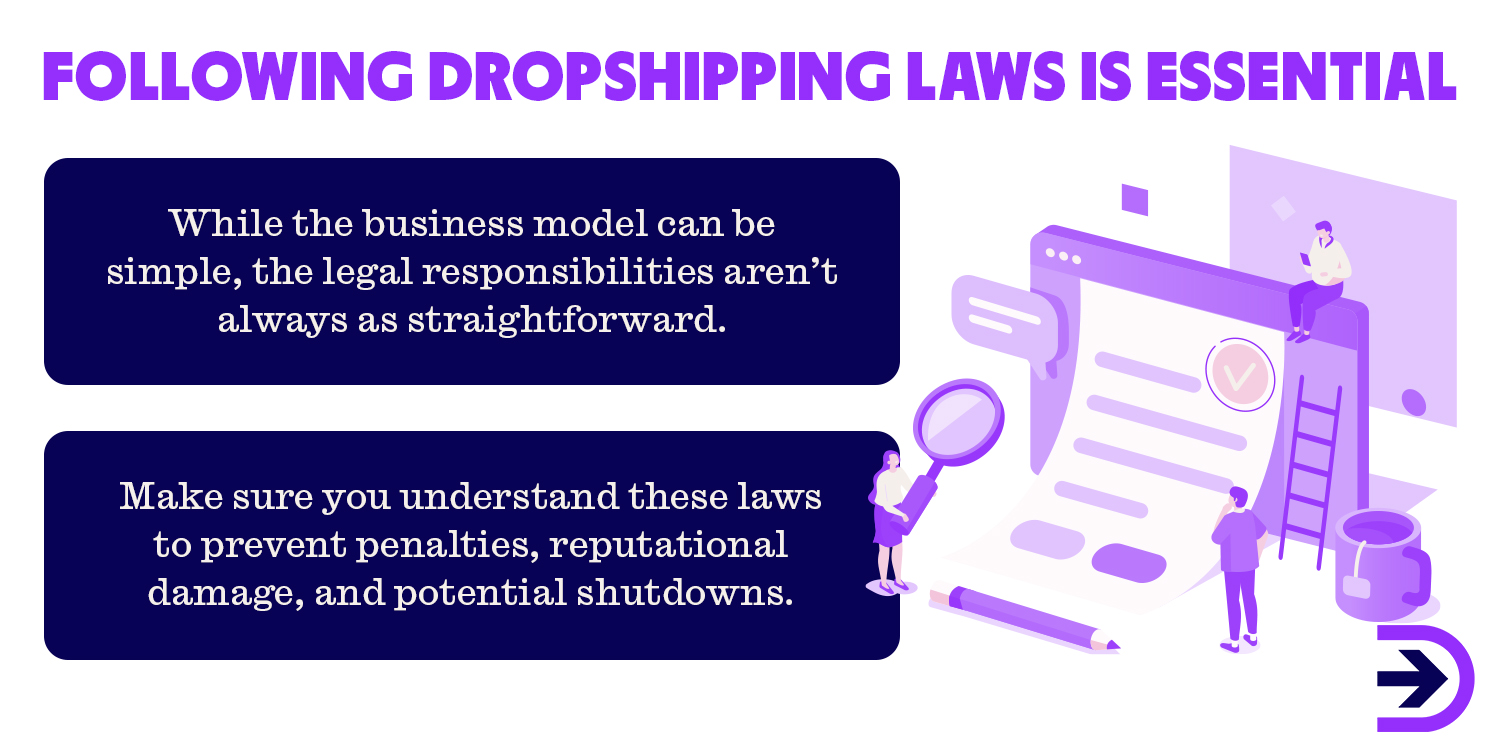
Next, we’ll explore the key legal requirements that Australian dropshipping businesses must follow to stay compliant.
Essential legal framework for dropshipping in Australia
Below are the dropshipping legal frameworks that every Australian business must adhere to:
Copyright laws
One important legal aspect to be aware of is copyright law, which falls under intellectual property (IP) rights. IP refers to original creations of the mind, such as designs, inventions, or artistic works. Using copyrighted content (such as product images, logos, or branded materials) without permission can have legal consequences. For instance, if your supplier sells counterfeit goods to fulfil your customer orders, you may be in danger of violating copyright law, even if you do not handle the products directly. Proceed with caution when partnering with dropshipping suppliers and take any ethical concerns seriously.
Consumer protection and product safety laws
Even if you don’t make a product, your online store must abide by consumer protection laws and product safety laws. As an online seller, you are responsible for the quality and safety of goods shipped directly to customers.
According to the ACCC guidelines, sellers must ensure that their products meet mandatory levels of safety and will not cause harm when used in a reasonable manner, including reasonable misuse. If a product you sell causes harm, you could face personal injury litigation, so it’s important to know the quality and materials your dropshipping suppliers use.
Tip: It’s best to have product liability insurance to cover you in case of any unforeseen issues.
Australian Consumer Law (ACL)
The Australian Consumer Law (ACL) applies to all businesses operating in Australia, including dropshipping businesses. Under the ACL, businesses must ensure that their products meet acceptable quality standards and provide consumer guarantees, regardless of whether they hold stock themselves.
Customers have the right to refunds, replacements, or repairs if a product is faulty, doesn’t match its description, or isn’t fit for purpose. Additionally, businesses cannot make false claims about their products, pricing, shipping times, or refund policies. Furthermore, if dropshipping suppliers are responsible for manufacturing and shipping the product, a retailer is expected to handle customer complaints and facilitate refunds or returns.
Tax and licensing laws
Australian dropshippers must comply with tax and licensing laws to operate legally. You’ll need to register your business with the Australian Business Register (ABR) and obtain an Australian Business Number (ABN) for tax and invoicing purposes. If your annual revenue exceeds $75,000, you must register for Goods and Services Tax (GST) and charge 10% GST on sales to your potential customers, remitting it to the Australian Taxation Office (ATO). Profits from dropshipping are also subject to income tax, and if you work with overseas dropshipping suppliers, withholding tax obligations may apply.
The two common business structures for dropshippers are Sole Trader, which is simple to set up but offers no personal liability protection, and Company (Pty Ltd), which provides limited liability but has more regulatory requirements. Additionally, some states may require a business license or sales permit to operate a retail business. If unsure about licensing requirements, consult a local legal professional.
Quick reminder: The information in this article is general in nature. Businesses must acquire independent legal advice to ensure compliance.
Import and customs regulations
Since dropshipping often involves sourcing products from overseas dropshipping suppliers, it’s essential to understand Australia’s import and customs regulations. If an order exceeds AUD 1,000, it may be subject to customs duty and Goods and Services Tax (GST) when it arrives in Australia, which could affect pricing and profitability. Additionally, certain products, such as pharmaceuticals, weapons, and specific electronics, are restricted and require special import permits. Ensuring compliance with these regulations will help you avoid unexpected costs, shipping delays, or legal issues when selling to Australian customers.
Privacy and data protection laws
Like any other online business, if you collect customer data, such as emails, addresses, or payment details, you must protect customer information and follow data privacy laws. Under the Privacy Act 1988 and the Australian Privacy Principles (APPs), businesses must include a clear privacy policy on their websites, obtain customer consent before collecting data, and keep customer information secure.
As a dropshipper, if you share customer data with dropshipping suppliers or use apps that handle customer information, you’re responsible for keeping that data safe. Breaking these laws can result in large fines.
Dropshippers must also follow platform rules, industry regulations, and ethical trade laws. Selling on Amazon, Etsy, or eBay requires compliance with their policies. Regulated products like food and alcohol need permits. Businesses must also adhere to anti-money laundering laws, sanctions, and anti-slavery regulations. Staying compliant ensures a trustworthy and legally sound business.
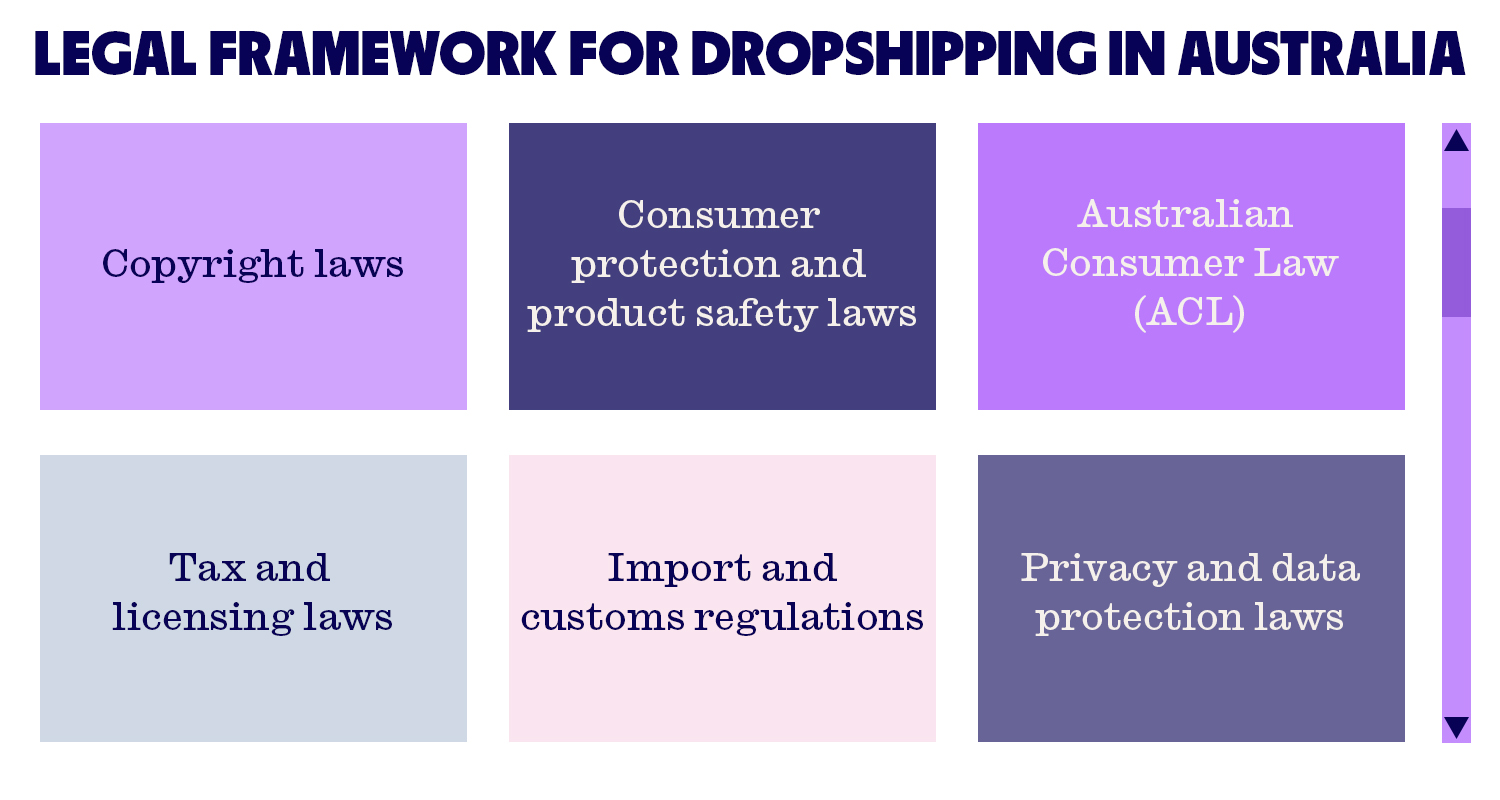
Key legal considerations for dropshipping
Here are a few other important legal considerations dropshippers should be aware of:
Supplier agreements
As a dropshipping retailer, you should establish clear agreements with your suppliers that outline responsibilities related to product quality, product guarantees, shipping, and returns. This helps to avoid disputes and ensures that both parties are on the same page regarding expectations. Remember, your supplier agreement is a legally binding contract, so make sure you get a copy in writing and ensure any changes are fully documented.
Terms and conditions
Retailers should also include comprehensive terms and conditions on their websites that outline the rules of purchasing from their stores. This includes shipping policies, refund policies, and disclaimers, which can help protect the business in case of customer disputes.
Advertising and marketing compliance
When creating advertising and marketing materials for your brand, be careful with advertising claims about your products. Misleading and false advertising can result in legal penalties under Australian Consumer Law. Always ensure your marketing is truthful and transparent about the product’s features, quality, and delivery timelines.
Environmental and ethical practices
With growing concern over sustainability, Australian consumers are increasingly seeking businesses that demonstrate ethical and environmentally friendly practices. Be aware of the environmental laws that may apply to the products you sell, particularly in regard to packaging and waste disposal.
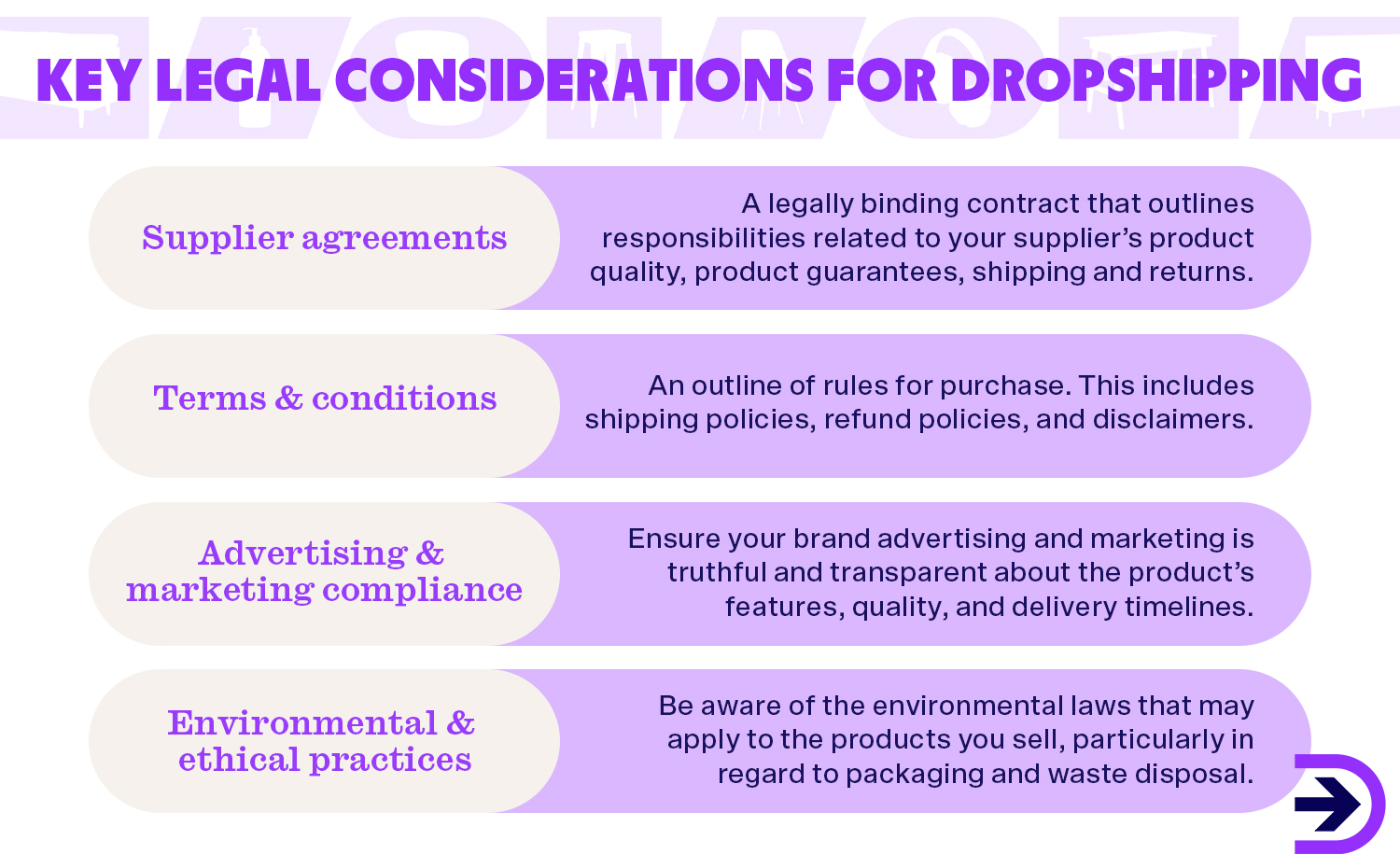
How to comply with dropshipping laws in your business
Here’s how to stay on the right side of the law while dropshipping in Australia:
Choose reliable suppliers
Work with reliable suppliers who provide genuine, high-quality products. Check their reputation, certifications and licenses, and compliance with Australian consumer laws. Avoid suppliers who sell counterfeit or unsafe goods, as you’ll be held accountable for any issues.
Provide clear policies on your website
Businesses must have well-defined terms and conditions, refund policies, and shipping information on their websites. Transparency helps build trust and protects you in case of disputes.
Stay tax compliant
Register for an ABN (Australian Business Number), and if your revenue exceeds $75,000 register for GST. Businesses must keep track of income, expenses, and tax obligations to ensure proper reporting to the ATO. If unsure, you must consult a tax professional.
Follow Consumer Law guidelines
A dropshipping store must ensure that their product descriptions, pricing, and advertising materials are accurate. They must also honour refunds and warranties as outlined under Australian Consumer Law.
Protect customer data
Businesses must use secure payment gateways and ensure their websites follow privacy laws. Clearly state how customer data is collected, stored, and used in your privacy policy.
Understand import regulations
If you're sourcing products from overseas, check for import restrictions and GST obligations on high-value orders. Remember to factor in any additional costs that may apply.
Strategies for legal compliance in dropshipping
Adopting the right strategies can help you run a legally compliant and sustainable dropshipping business. Here are some of the ways you can maintain legal compliance while dropshipping in Australia:
Regularly review laws and regulations
Ecommerce and dropshipping laws evolve, so stay updated on changes to Australian Consumer Law, tax obligations, and import regulations. Join business groups, online forums or newsletters, and consult legal professionals when needed.
Use contracts and keep written agreements
Create a formal dropshipping agreement with suppliers to outline quality expectations, shipping responsibilities, and return procedures. This protects you if a supplier fails to deliver as promised.
Invest in product liability insurance
Since you’re responsible for the products you sell, having insurance can protect you against legal claims arising from defective or harmful products.
Be transparent in your marketing
Dropshipping businesses must include accurate information on their websites. Ensure all advertisements, product descriptions, and pricing details are truthful. Misleading claims can result in penalties under consumer protection laws.
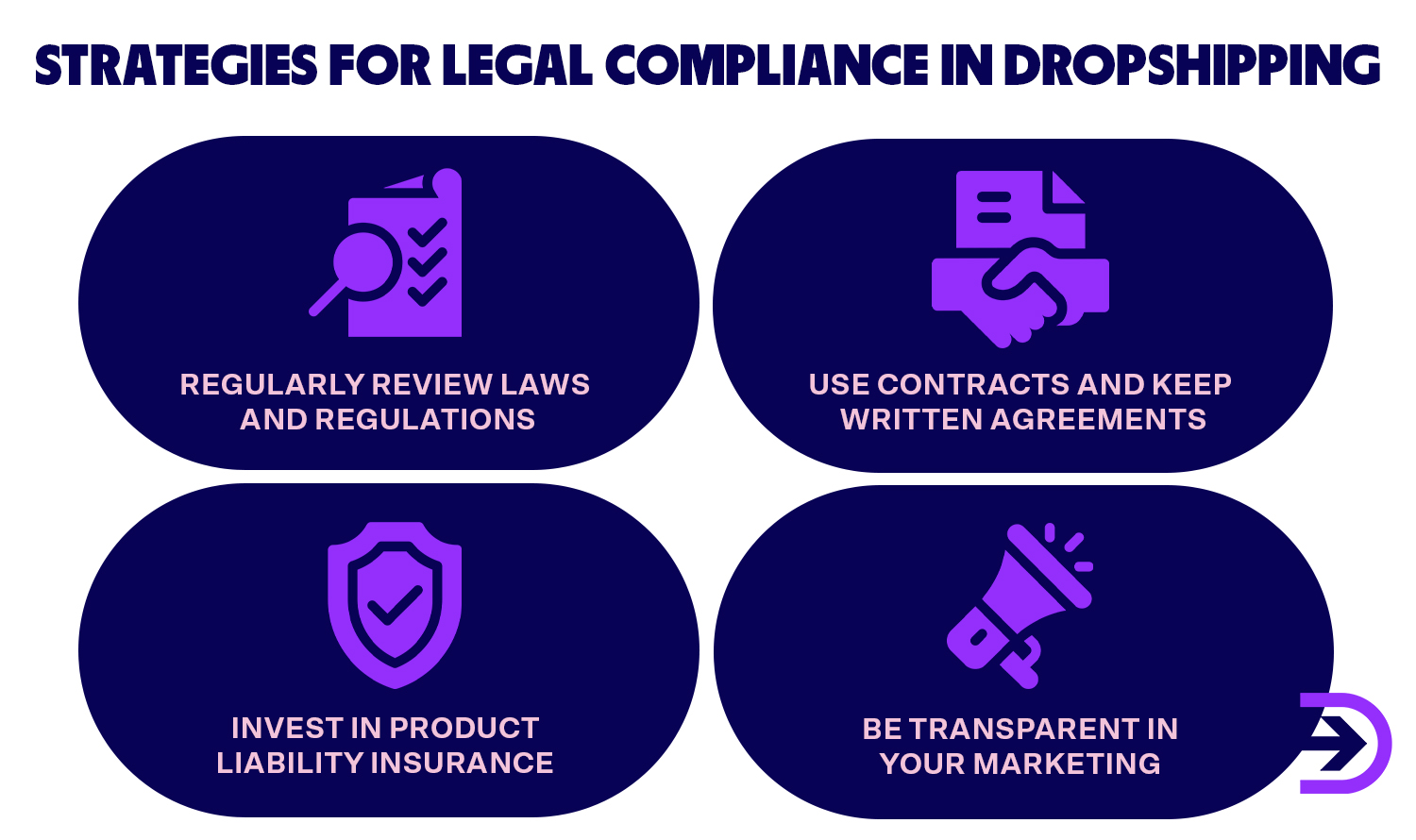
Common errors in navigating dropshipping laws
Here are some common pitfalls to avoid:
Ignoring consumer rights
Some dropshipping retailers mistakenly assume that they have no obligations since they don’t manufacture or ship products themselves. However, under Australian law, you’re still responsible for refunds, warranties, and product safety.
Using copyrighted content without permission
Dropshipping companies must always get permission to use copyrighted content or to create their own content using licensed properties. Using supplier-provided product images or marketing materials without verifying their copyright status can lead to legal action. Counterfeit suppliers often steal product images from their original creators, which is why some businesses may want to reverse image search potential suppliers’ products before entering a business agreement.
Not registering for GST
If your dropshipping business earns over $75,000 annually, you must register for GST. Failing to register for GST can result in penalties from the ATO. Monitor your revenue and register promptly when required.
Overlooking privacy obligations
Collecting customer data without a privacy policy or secure handling procedures can result in legal trouble. Businesses must always ensure compliance with the Privacy Act and store data securely.
Choosing unreliable suppliers
Find dropshipping suppliers that are trustworthy to work with. Working with unreliable suppliers can result in delays, quality issues, and legal disputes. Businesses must vet suppliers carefully and establish agreements to protect their business.
Summary
Running a legally compliant dropshipping business in Australia involves more than just finding suppliers and making sales. Retailers must follow dropshipping legal requirements including following consumer protection laws, registering for taxes, ensuring product safety, and handling customer disputes responsibly. Avoiding common mistakes and adopting compliance strategies can help your business thrive while staying legally sound.
By choosing reliable suppliers, maintaining transparent policies, and keeping up with regulatory changes, you can build a successful and legally compliant dropshipping business in Australia.
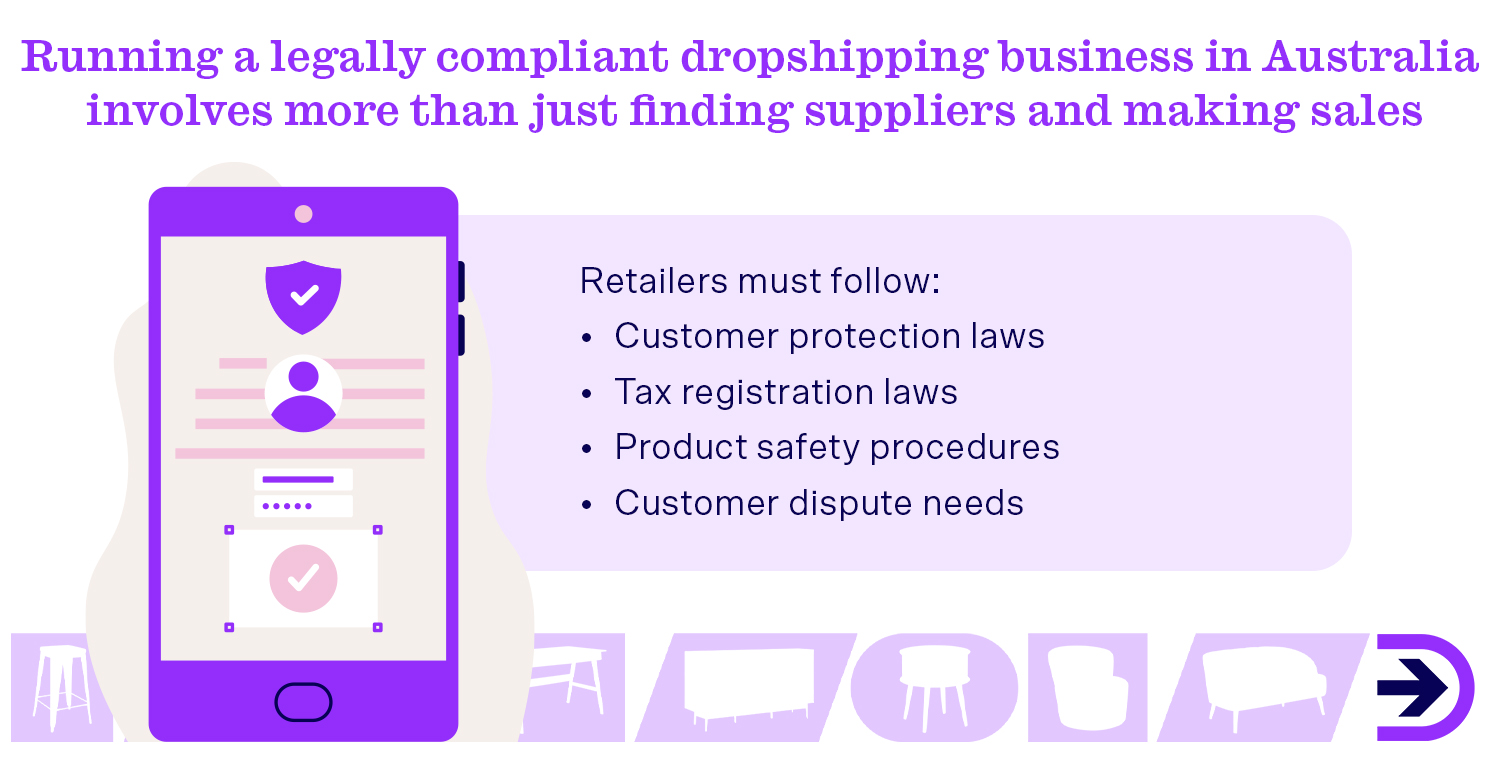
FAQs
Do I need a business license to start a dropshipping business in Australia?
Not always. The dropshipping model doesn’t require a specific business license, but you need to register your business with an Australian Business Number (ABN). Some product categories, like food or cosmetics, may require special permits.
Am I responsible for refunds and returns if my supplier is overseas?
Yes. Under the Australian Consumer Law, you must handle refunds, replacements, and warranty claims and honor consumer guarantees, even if your supplier is located overseas.
Do I have to charge GST on dropshipping products?
If your business earns over $75,000 per year, you must register for Goods and Services Tax (GST) and charge 10 per cent on sales to Australian customers.
What happens if I sell a product that is faulty or unsafe?
If a product causes harm or doesn’t meet safety standards, you could be held liable. It's essential to work with reputable suppliers and consider product liability insurance.
How can I ensure my marketing is legally compliant?
You should avoid misleading claims about products, shipping times, and pricing. Ensure all advertising is accurate and follows the guidelines set by the ACCC.
Important Disclaimer: The information provided in this article is intended for general informational purposes only and does not constitute professional legal advice. While efforts have been made to ensure the accuracy and reliability of the content, laws related to dropshipping in Australia can be complex and subject to frequent changes. The author is not a licensed professional, and the guidance offered here may not address all specific dropshipping scenarios or obligations. Readers are encouraged to consult with a qualified legal advisor to receive personalised advice tailored to their individual circumstances. The author and publisher of this article disclaim any liability for actions taken or not taken based on the information provided here.

